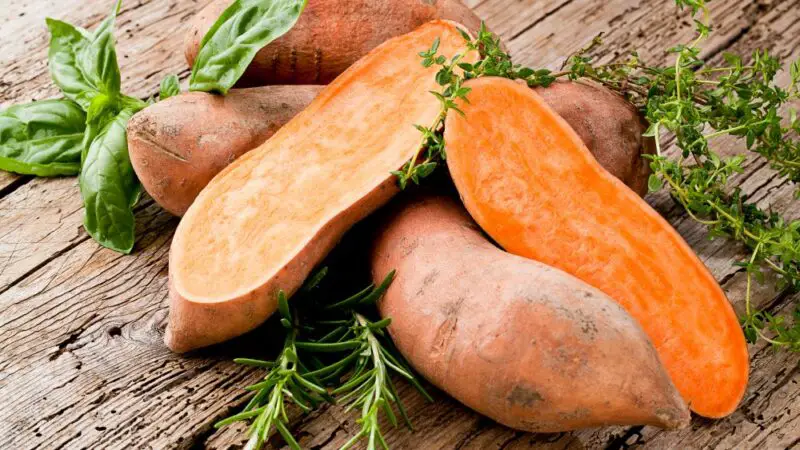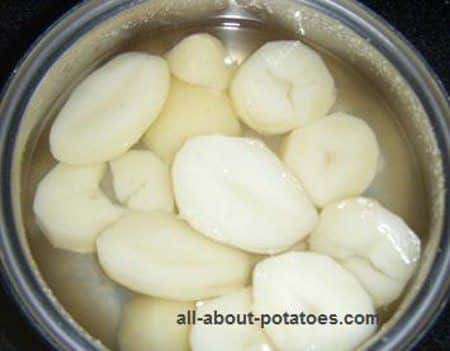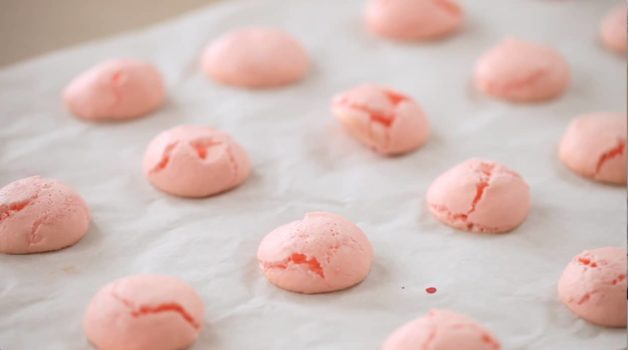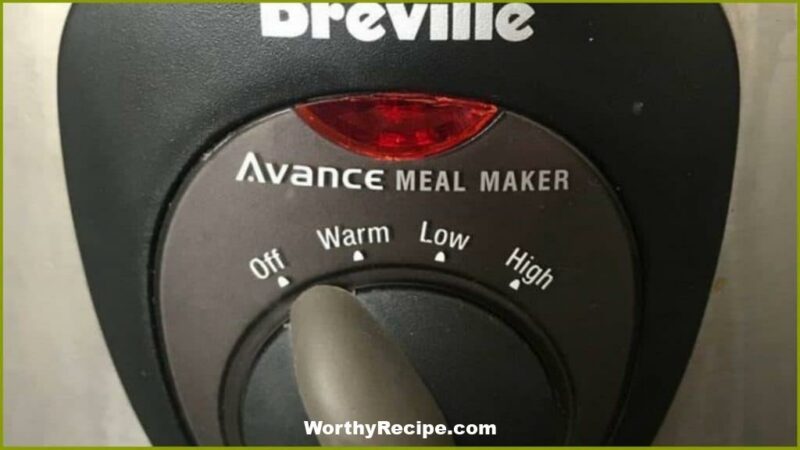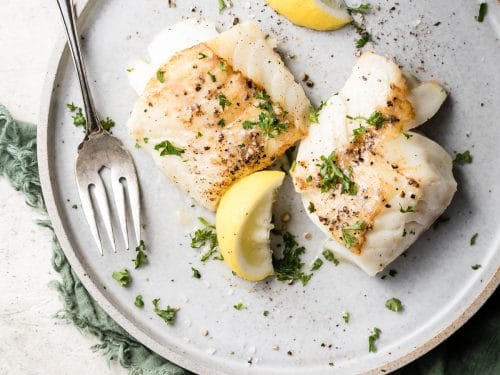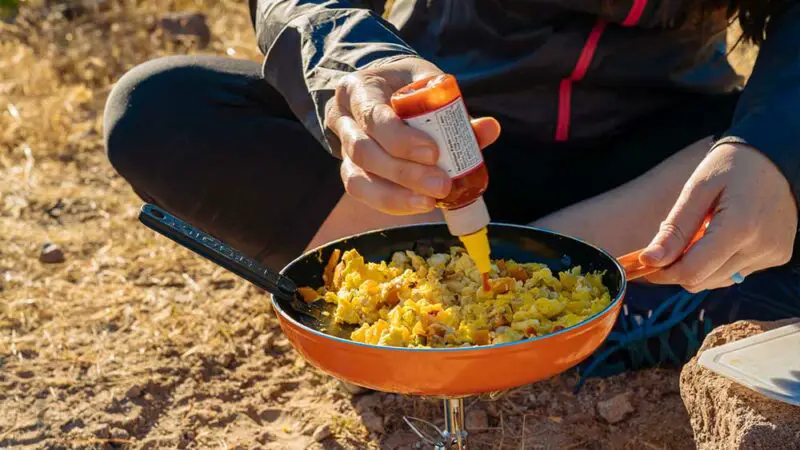Quick Answer: Why Is My Sweet Potato Tough After Cooking?
Sweet potatoes are a staple in many households, especially during the fall and winter months. These root vegetables are versatile in cooking and are packed with nutrients like vitamins A and C, fiber, and potassium. However, sometimes when we cook sweet potatoes, they come out tough instead of soft and fluffy as expected. In this article, we’ll explore the reasons why sweet potatoes can be tough after cooking, how to prevent this from happening, and what to do if it does happen.
Learning About Sweet Potatoes
Before we dive into why sweet potatoes become tough after cooking, let’s first understand what sweet potatoes are and what makes them different from regular potatoes. Sweet potatoes are root vegetables that come in several varieties ranging in color from white, yellow, orange to dark purple. Unlike regular potatoes that are part of the nightshade family, sweet potatoes belong to the morning glory family.
The texture of sweet potatoes varies depending on the type you buy. Some types have firmer flesh that holds up well to roasting or grilling while others have softer flesh that is better suited for mashing or pureeing.
Sweet potatoes are a perfect side dish or ingredient for any meal because not only do they taste great but they’re also beneficial for our health. They contain key nutrients like complex carbohydrates, fiber, beta-carotene, iron and lots of Vitamin C.
Cooking Sweet Potatoes
Cooking sweet potatoes may seem easy enough; you peel them, cut them up and then put them in an oven or on a stove top until they soften. Typically boiling or baking methods are used for cooking sweet potatoes but here is what you need to know:
Different Cooking Methods for Sweet Potatoes
How you cook sweet potatoes can impact their texture. Here are some popular cooking methods used for sweet potatoes:
- Baking – Preheat your oven to 200 C and place your peeled sweet potato chunks on a baking tray with some oil or butter. Bake for 30-40 minutes depending on the size of the chunks until they are tender throughout.
- Boiling – Boil sweet potato chunks in water for about 20 minutes or until they’re soft enough to be mashed easily with a fork.
- Roasting – Cut sweet potatoes into halves or wedges, toss them in oil and seasonings of your choice, then roast them in the oven at 180 C for about 20-30 minutes.
Factors that Affect Cooking Times
Sweet potatoes differ in size, freshness, and texture depending on how long ago they were harvested. Here are the key factors that can affect cooking times:
- Size – The size of the sweet potato determines how long it will take to cook through fully.
- Freshness – Fresher sweet potatoes will take less time to cook than older ones because they are more moist and easier to break down.
- Temperature – The temperature at which you cook your sweet potatoes will dictate how long it will take for them to soften fully.
How to Know When a Sweet Potato Is Fully Cooked
You’ll know when your sweet potato is fully cooked when it’s soft all around. Boiling takes 15 to 20 minutes, roasted halves take about half an hour, while roasted chunks might need longer since they need more time per surface area to roast thoroughly. Baked sweet potatoes may take up to an hour in the oven.
Understanding the Problem
Tough sweet potatoes can be a real disappointment even after you’ve taken your time to cook appropriately. Here are some of the reasons why sweet potatoes become hard after cooking:
- Undercooked – If your sweet potato is still hard after you’ve cooked it, there’s a high chance that it is simply undercooked. This usually happens when you don’t cook your sweet potatoes long enough or use too high heat.
- Overcooked – On the other hand, if you cooked your sweet potatoes for too long, they’ll become mushy and entrapped with air pockets making them dry and tough.
- Common mistakes people make when preparing sweet potatoes include not correctly checking the sweetness before purchase as overripe ones are more prone to harsh texture change and also cutting them into pieces that are unevenly shaped thus requiring different cooking times.
Possible Solutions
Here are some tips to help you make soft, fluffy sweet potatoes every time:
Soaking Sweet Potatoes Before Cooking
If you’re short on time soaking your sweet potato beforehand can soften it significantly before putting it in the oven or boiling pot. Soaking achieves the same effect that would otherwise happen by letting the potatoes slow-cook in juices over extended periods. You may soak for at least half an hour with either saltwater or ordinary water as this reduces the cooking time and improves on taste.
Adjusting Cooking Times and Temperatures
The ideal temperature for roasting sweet potatoes is 180 C to 200 C or degree Celsius. If you roast or bake at a higher temperature, it leads to overcooking; conversely, low temperatures make them take more than needed and thus tend to become harder. Also, check for sizes beforehand and adjust cooking times to align with their size.
Adding Moisture or Oils
If you’re cooking sweet potatoes in the oven, you can add some oil or butter after roasting to improve on tenderness. Alternatively, just wrapping a sweet potato in foil before baking can help keep it moist and tender or even adding more liquid (water) when boiling, which also works amazingly.
Troubleshooting Tough Cooked Sweet Potatoes
If you discover your sweet potato is tough after it’s already cooked, don’t fret there still are solutions available:
Identifying Signs of Undercooked vs. Overcooked Sweet Potatoes
The easiest way is to get familiar with a properly cooked sweet potato’s texture so that you know what feels good to take into your mouth
- Undercooked – An undercooked sweet potato will be hard and starchy in texture, which might not always be easy to know because it could still look perfect on the outside but remain tough inside.
- Overcooked – An overcooked sweet potato is mushy, wet and brownish-yellow in color, whereas boiled ones will turn orange instead.
Strategies for Fixing Undercooked Sweet Potatoes
If you realize that your sweet potatoes are under-cooked, put them back in the oven or boil for another 10-15 minutes until they cook through till the core and become soft all around. Alternatively, if you’re short on time microwave them for two-minute intervals until satisfied.
Making Use of Overcooked Sweet Potatoes
Over-cooked sweet potato isn’t suitable for roasting since they fell apart easily as they’re soft inside already. The best way to use these potatoes is puree or mashed sweet potatoes. One can add them to soup or casseroles in place of thickening agents resulting in heightened nutrition levels.
Best Practices for Cooking Sweet Potatoes
If you want consistently soft and fluffy sweet potatoes, keep these tips in mind:
- Always check the texture before buying; fresh and smooth ones tag along with excellent texture changes when cooked.
- Cut pieces uniformly for even cooking and also avoid extremes like excessive heat or long-slow cooking.
- Cook at recommended temperatures and with a measured amount of moisture as this prevents unnecessary toughness changes
- Follow recipes closely if using one, and don’t be tempted to rush the process. A vital step may be added that is hidden to your eyes but important in achieving softness.
- Apart from seasoning for taste, remember to relax and have fun as it’s not worth the stress.
Conclusion
Hard cooked sweet potatoes can be super frustrating, especially after taking the time to prepare them carefully. By being aware of the causes of hard sweet potatoes and learning how to fix them, you’ll be able to have consistently delicious dishes every time.
Keep in mind that taking a few extra measures when preparing your sweet potato will ensure you get the perfect texture every time. Once you master this skill, adding sweet potato dishes in your meal plan will surely not disappoint you.
Frequently Asked Questions
#### 1. What causes sweet potatoes to be tough after cooking?
Sweet potatoes can become tough after cooking due to various reasons such as undercooking, overcooking, using the wrong variety of sweet potato, or storing them improperly. If the sweet potato is not cooked enough, it will remain hard and starchy. Overcooked sweet potatoes will also become tough.
#### 2. How can I prevent my sweet potato from becoming tough?
To prevent your sweet potato from becoming tough after cooking, make sure to select the right variety of sweet potato. You should also ensure that you cook them to the correct temperature. Avoiding overcooking or undercooking is essential in keeping a tender texture.
#### 3. Can I salvage a tough sweet potato after it has already been cooked?
It’s possible to salvage a tough sweet potato by adding moisture back into it with steam or boiling water. Consider reheating your sweet potato in the microwave with a small amount of water and covered with a damp paper towel.
#### 4. Are there any tips for ensuring tender and flavorful sweet potatoes?
The key to achieving tender and flavorful sweet potatoes is to select the right type of sweet potato, properly cooking it through, and storing it well in dry spaces.nnAlso, consider adding flavorful spices such as cinnamon or rosemary while cooking; Use parchment paper during roasting to get even cook; Boil then bake method is perfect for getting proper tenderness in all spots; Or beginning roasting at 425 F degrees for about 15-20 minutes initially can give some initial crispiness while having softness in the center.
